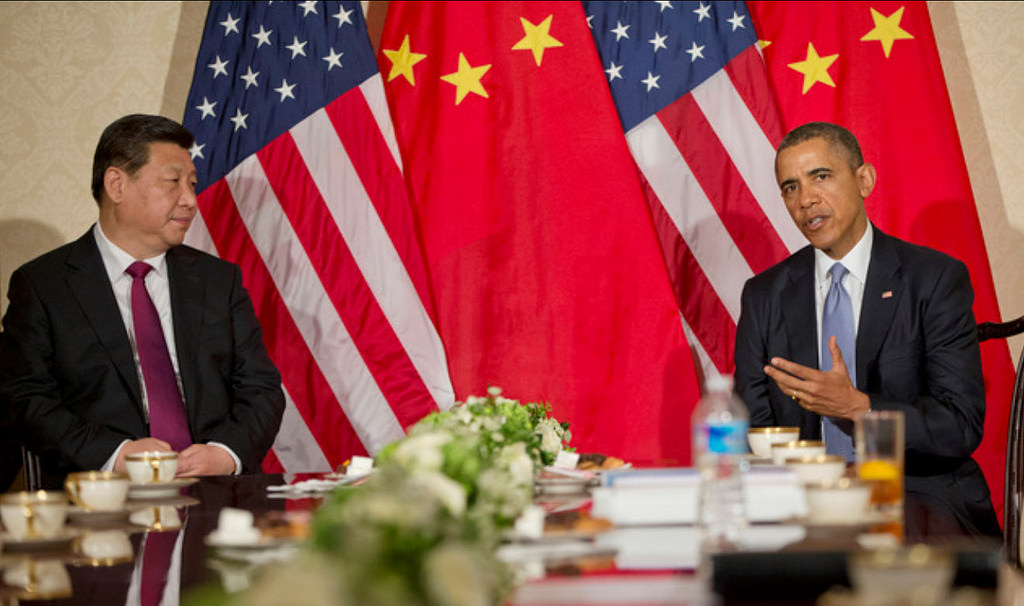Over the weekend Chinese President Xi Jinping and US President Barack Obama formally ratified the landmark Paris climate change agreement. The joint announcement by the world’s two largest CO2 emitters came ahead of the G20 summit in the Chinese city of Hangzhou on September 3, 2016. Historically, the US and China have abstained from ratifying major climate change treaties. Their commitment marks the first time the world’s largest emitters have become formal parties to a global climate accord. Jennifer Morgan, the executive director of Greenpeace International, welcomed the new commitment, saying that the participation of the two major polluters is likely to single in “a new era in global efforts to address climate change.”
The Paris Agreement is the product of two weeks of intensive negotiations at COP21 last December in Paris. Hailed as the world’s first comprehensive climate agreement, the Paris agreement is a legally-binding convention signed by 195 nations to stabilize greenhouse gas concentrations in the atmosphere. The climate agreement specifically aims to keep global temperature increases “well below” 2.0C (3.6F) above pre-industrial levels – a level of warming deemed to be the point at which irreversible damages to the global climate could occur. In order to legally come into force, the Agreement must be ratified by 55 countries that collectively represent at least 55% of global emissions.
Before the joint pledge was made, the Paris accord had begun to lose momentum. Since the ratification period opened in early 2016, only 24 nations, accounting for just over 1% of global emissions, have ratified the agreement. With the US and China on board, 26 countries accounting for around 39% of global emissions have become party to the convention, increasing the likelihood of the climate accord coming into force by the end of 2016 . According to Brian Deese, a senior advisor to President Obama, the commitment made by China and the U.S. has accelerated a process that would otherwise have taken several years to complete.
The Paris agreement success stems from its ability to transcend the issues of binding targets and equity that have devalued previous climate accords. Binding emission reduction targets have a historical tendency to deter big emitters. In earlier climate accords, such as the Kyoto Protocol and the Copenhagen Accord, legally binding environmental obligations have been a key reason for failure. Many industrialized states take an offensive position against this framework, arguing that it can cause serious harm to their economies, job markets, trade relationships and consumer costs.
Unlike its predecessors, the Paris Agreement’s more lenient emission reduction framework appeals to large emitters. The involvement of big emitters is essential for a treaty to accomplish its mandate. Without their inclusion, the majority of GHG emissions would go unregulated and treaty could be incapacitated. As a result, in Paris concessions were made to secure their participation. However, these changes haven’t appealed to all large-emitting countries. More recently, opposition has come from states whose economies rely largely on fossil fuels for exports, such as Middle-Eastern oil-producing states, as well as countries with large energy industries.
For developed and developing countries alike, these resources form an essential part of the economy, and so the political and economic costs of curbing emissions can be extremely high. In Paris, big emitters the US, India, China and South Africa made it known that they would be unwilling to sign onto an accord that could hinder their economic growth. To avoid the disappointment of previous accords, ongoing progress reports and a strong review mechanism were substituted for binding emission targets and strict penalties. Unlike its predecessors, the Paris Agreement’s national pledges are voluntary, meaning national emission caps or intended nationally determined contributions (INDCs) are individually determined by each state party. Although the non-binding elements of the Paris regime have been criticized as a potential source of inefficiency, thus far they have proven to be more beneficial than detrimental.
The involvement of economic actors complemented these revisions and has ensured that, unlike the past “the private sector sees value and opportunity in curbing carbon emissions.” Following decades of divisions and inactivity, there is a sense of urgency and resolve in this realm of diplomacy. The Paris agreement is not flawless, but with the US and China as formal members of the convention, the accord is projected to be an invaluable actor in the fight against climate change.
The failures of previous climate accords to engage great powers has resulted in a severe under-management of the climate change threat. In this respect, the Paris Agreement is a step in the right direction. The participation of the US and China should be celebrated as a signal of renewed political determination in the fight against climate change.
Climate campaigners are now expecting a ‘surge’ in ratification before the next UNFCC summit in Marrakesh in November. The US and China are hoping to lead by example and create momentum for other signatories to formalize their commitment to the Paris Agreement. Major emitters like Brazil and India are expected to follow suit shortly, after completing domestic legislative processes to ratify the agreement.
Photo: US President Barack Obama during a bilateral meeting with Chinese President Xi Jinping (2014), by Pablo Martinez Monsivais/AP via flickr. Licensed under CC BY-ND 2.0.
Disclaimer: Any views or opinions expressed in articles are solely those of the authors and do not necessarily represent the views of the NATO Association of Canada.




